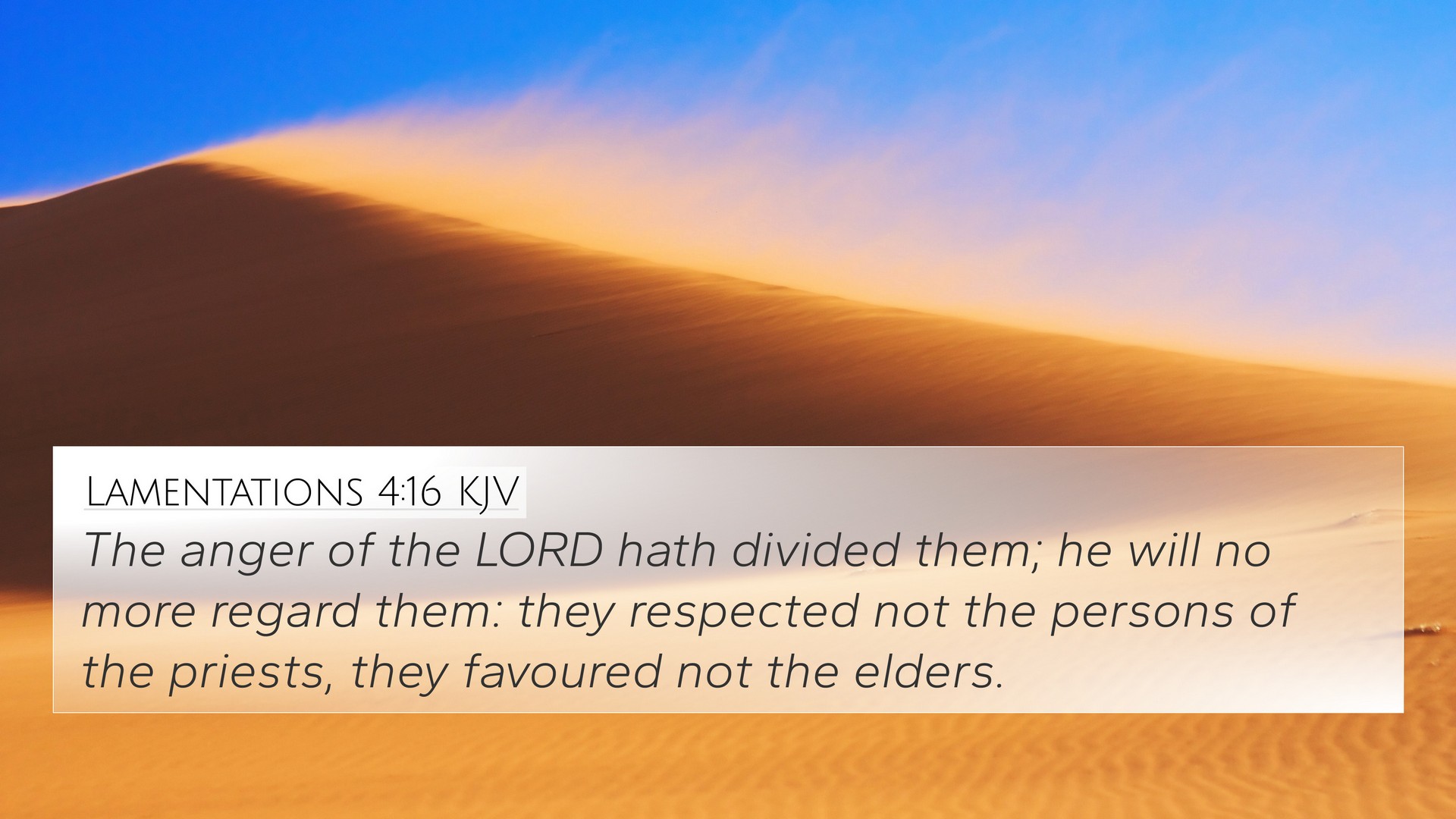Lamentations 4:16 - Meaning and Interpretation
Bible Verse Reference: Lamentations 4:16
“The anger of the Lord hath divided them; he will no more regard them: they respected not the persons of the priests, they favored not the elders.”
This verse encapsulates the profound sorrow and desolation experienced by the people of Jerusalem after their fall, showcasing the dire consequences of divine judgment.
Summary of Insights
The interpretation of this verse draws heavily upon the historical context in which it was written, primarily focusing on the devastation felt during the Babylonian siege. The components of the verse highlight critical themes such as divine anger, social hierarchy, and the consequences of sin.
Key Themes and Meanings:
- Divine Anger: The commencement of God's anger leads to a division among the people, signifying a withdrawal of divine favor.
- Judgment and Rejection: God no longer regards or favors the priests or elders who were once esteemed, indicating the seriousness of Israel's transgressions.
- Social and Religious Equivalence: The failure to respect leaders signifies a breakdown of societal norms and religious duties, reflecting a larger moral collapse of the nation.
Commentary Insights
Matthew Henry’s Commentary
Henry emphasizes the theme of divine displeasure, noting that the leaders of the people had abandoned their responsibilities, leading to their downfall. The verse is a stark reminder of the consequences when God's commandments are ignored by those in authority.
Albert Barnes’ Notes
Barnes elaborates on the division caused by God’s anger, pointing out that leaders who fail their people are equally liable to divine judgment. He underscores how the failure to honor religious figures leads to a collapse of societal order.
Adam Clarke’s Commentary
Clarke discusses the implications of God’s anger being poured out through neglect and injustice. He notes that when leaders disregard their sacred duties, it invites divine wrath, and the people suffer from their leaders’ corruption.
Related Bible Verses
This verse can be cross-referenced with several other biblical passages that highlight similar themes of judgment, leadership, and divine anger:
- Jeremiah 6:30: "Reprobate silver shall men call them, because the Lord hath rejected them." - Reflects rejection due to unworthiness.
- Isaiah 1:5-6: “Why should ye be stricken anymore? Ye will revolt more and more…” - Conveys the futility of divine discipline against unrepentant individuals.
- Ezekiel 34:10: “Thus saith the Lord God; Behold, I am against the shepherds; and I will require my flock at their hand…” - Highlights God’s judgment on irresponsible leaders.
- Psalm 107:39: "Again, they are minished and brought low through oppression, affliction, and sorrow." - Illustrates the plight of people under the weight of divine disfavor.
- Micah 3:11: "The heads thereof judge for reward, and the priests thereof teach for hire..." - Critique of corrupt leadership failing to uphold justice.
- Hosea 4:9: “And there shall be, like people, like priest…” - Correlation between the moral condition of the people and their leaders.
- Romans 2:6-8: "Who will render to every man according to his deeds..." - Emphasizes God’s impartial judgment based on one’s actions.
Understanding Inter-Biblical Connections
To deeply appreciate the implications of Lamentations 4:16, one should consider its interconnections with various biblical themes:
- Links between leadership failure and societal collapse.
- Recurring motifs of divine judgment found throughout both the Old and New Testaments.
- Comparative analysis of prophetic references that call for repentance and warn of impending judgment.
Tools for Cross-Referencing Biblical Texts
Utilizing tools such as a Bible concordance or a Bible cross-reference guide can aid in exploring the relationships between verses. Learning how to use Bible cross-references enhances the depth of study during personal reflection or sermon preparation.
Conclusion
Lamentations 4:16 serves as a poignant reminder of the consequences of forsaking God’s commandments, particularly through the lens of leadership. The verse invites contemplation on the sacred duties of those in authority and the ultimate accountability everyone has before God.















